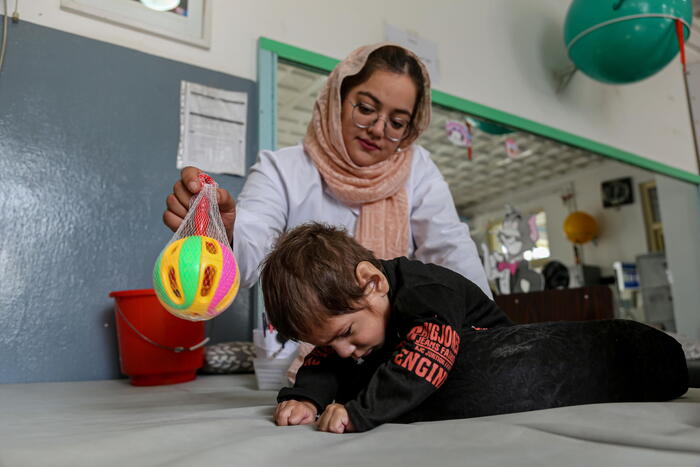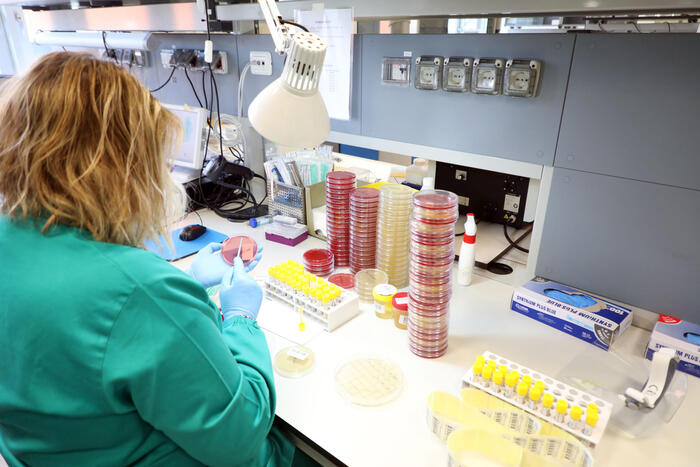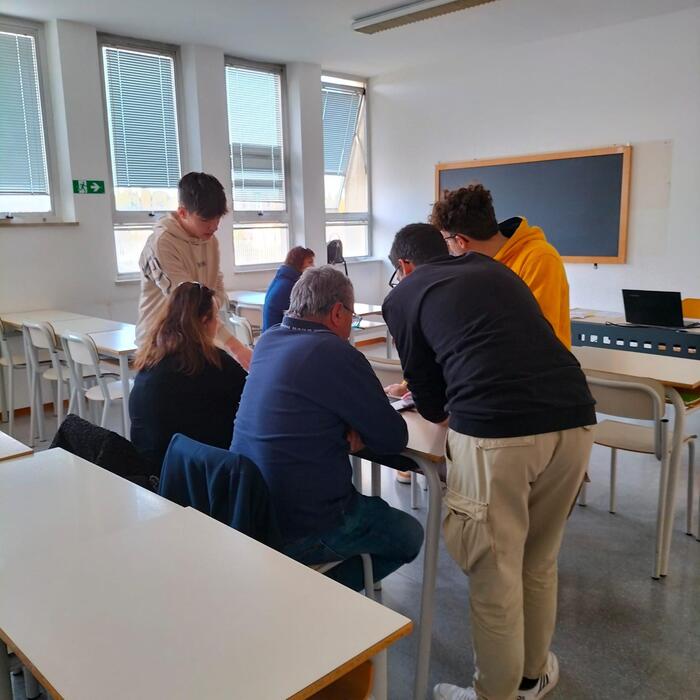In the airlock of a high school in Seine-Saint-Denis, printed courses and deposited in an airlock, wait for students to come and pick them up. Same scene, in a college in Normandy, where the principal gives copies to parents, respecting the barrier measures against the coronavirus. These students, without a printer, a computer, or even some with access to the Internet, are not the only ones to be handicapped by these two weeks of confinement which precipitated the closure of schools.
According to the Minister of National Education on Tuesday, "5 to 8% of students" do not give a sign of life to their teachers. "There is a great risk" that the current situation "widens the inequalities", alarms Jean-Michel Blanquer. If the vast majority remain finally reachable by phone or email, a certain proportion is concerned by this digital divide, with the consequences that this can have on their school career. For students and teachers alike, it's time to get by.
"When the 4G plan runs out, you have to make choices"
"We are on call to try to solve connection problems and reach the families of students who do not connect," explains the CPE of a college in Essonne, imitated by many establishments. Out of 700 students, there are only three unreachable, but about 200 others have not connected or have not made a homework. "
In order to reduce these digital difficulties as much as possible, his college lent twenty tablets. She also slips the anecdote of this very precarious mother, who came to get one of these devices, but verbalized on the way. "She had no certificate, but I doubt that she can write," blows the official.
Even with a tablet, the situation remains problematic for homes without wi-fi connection. "Some families only have 4G and when the package runs out, you have to make choices between maintaining ties with loved ones and accessing their child's lessons," describes this UEY. While it sometimes costs more than 25 euros for a 50 GB package, a teacher from Aubervilliers (Seine-Saint-Denis) who has received only two-thirds of the exercises requested from her CM2, offers the establishment of an "unlimited Internet package for all until the end of confinement".
Another recurring problem, highlighted by a daycare center working in Seine-Saint-Denis: “A large number of students have no computer or only one, to share with the whole family, including parents who telecommute. So you have to manage, for those who have it, with their smartphone. “Some read their lessons on it, copy the questions on a sheet, then send screenshots of the teachers' answers. It's DIY, ”comments this thirty-something.
If he considers that the number of families completely deprived of Internet remains "marginal", he evokes however regular cuts of Internet in the district of his high school, which can vary "from one hour to sometimes a whole day". And when the connection is stable, another problem can arise: the digital work environment (ENT), the platform where students must connect, is often saturated and inaccessible.
Videoconferencing is becoming problematic
Simon has a computer, but no connection. This 17-year-old high school student from Gers lives in what is called a "white area", with little or no access to the Internet. "To watch a 10-minute video, you have to let it download for half an hour and to send SMS, you leave the house," he reports.
Newsletter - The essentials of the news
Every morning, the news seen by Le ParisienI'm registering
Your email address is collected by Le Parisien to allow you to receive our news and commercial offers. Find out more
So, he can forget the videoconferencing courses offered by his teachers. "It keeps disconnecting, so often my friends then send me the items," he slips. The young man, who finally succeeded in doing all the required homework, remains a philosopher: "We are disadvantaged compared to students who have a good connection, but we cannot say either that we are in the worst situation "
A history-geography teacher from Lille (Nord), who also believes he works in a "rather privileged high school", understands that "it is very complicated to follow up" with his students. “I only received three-quarters of the homework requested. Among them, some send me the PDF or Word files as requested, others handwritten and photographed by phone. But I also received emails from third parties, ”he lists.
Like this cousin of one of her students, who has no connection on her phone. "We are often deceived by the use of smartphones in the classroom, but that does not mean that they all have good access to digital," laments the teacher. Under these conditions, it is impossible to take videoconference lessons, he says. "Otherwise, I would leave students on the side. "
"I prefer equality to the digital divide"
"The video we forget. By my place, it is very complicated to handle the computer tool, adds a teacher of Segpa (sections of general and adapted professional education) in Normandy. It breaks my heart, but I prefer equality to the digital divide. He describes his students as "in difficulty and not from the wealthy population", and for whom "digital is experienced as a burden". According to him, 80% of his middle school students do not know how to connect to the platform. His principal sometimes prints homework, which he hands over to neighboring students. "But some parents are afraid to go out, and others live 5, 10 or even 15 km from the college," he saddens.
All the members of the educational teams contacted are unanimous, this confinement accentuates the inequalities already present in the classes. “Some cumulate, estimates the CPE of Essonne. In addition to this digital divide, they grow up in families that do not have school codes. "For the most distant from school culture, it is a hassle, adds his colleague from 93. More than digital, it is the resources at home that differ. When you call a family, you feel the atmosphere. If you hear children crying, you can imagine the conditions under which they have to work. Our job is to try to reduce social inequalities, but here it is worse. "
The Minister of Education promised Tuesday morning that each teacher can, thanks to an agreement with the Post Office, send documents to students without equipment. But the measure leaves some skeptics as to its feasibility.
He also planned to develop "educational summer camps" and "free tutoring modules". In Essonne, the CPE consulted did not wait for these announcements to work on post-containment. "We know that going back to school will be difficult for some, there will be very heterogeneous levels," she judges. We are thinking with City services to set up a tutoring workshop to help some. But the more the confinement time will elapse, the more inequalities there will be. "









